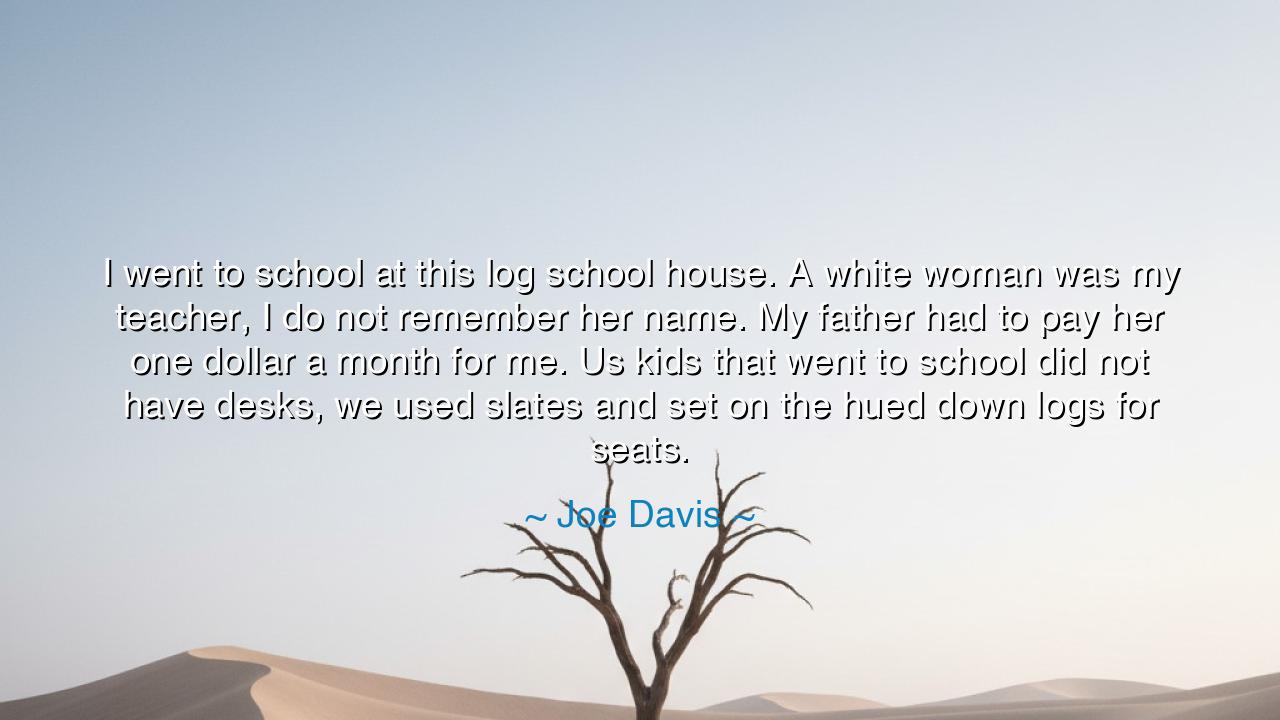
I went to school at this log school house. A white woman was my
I went to school at this log school house. A white woman was my teacher, I do not remember her name. My father had to pay her one dollar a month for me. Us kids that went to school did not have desks, we used slates and set on the hued down logs for seats.






In the humble words of Joe Davis, we hear the echo of a time when education was not a polished institution, but a hard-won treasure: “I went to school at this log school house. A white woman was my teacher, I do not remember her name. My father had to pay her one dollar a month for me. Us kids that went to school did not have desks, we used slates and set on the hued down logs for seats.” This testimony, though plain, is rich with meaning, for it speaks of sacrifice, perseverance, and the dignity of learning even in the simplest of settings.
The log school house stands as a symbol of beginnings—rough, unfinished, yet sacred. It was not adorned with fine architecture or filled with luxuries, but it contained something greater: the possibility of knowledge. In such places, countless children of poor families, often freshly freed from bondage or struggle, gathered to pursue the light of literacy and learning. The building may have been crude, the seats uncomfortable, but the lessons taught there carried the power to transform lives. It is a reminder that greatness does not depend on outward splendor, but on the spirit of those within.
Davis remembers his teacher, though not her name. This anonymity reveals another truth: often it is not the famous who shape destinies, but the forgotten, the ordinary souls who give their time and patience. The nameless woman who taught in that log house carried the torch of knowledge, and though her name is lost to history, her influence endured in the lives of her students. Here we see the paradox of teaching: the teacher may fade, but the knowledge remains, living on through generations.
The sacrifice of his father, who paid one dollar a month for schooling, is the heart of this memory. In an age when money was scarce and every coin was precious, to give even a single dollar for education was no small act. It was a declaration of faith—that knowledge was worth more than immediate comfort, more than food or clothing, because it opened the door to a better future. Many fathers and mothers across history have made such sacrifices, planting trees whose shade they themselves would never sit under. This is the essence of love and foresight, to give beyond one’s means so that one’s children may rise higher.
The absence of desks, the reliance on slates, and the use of logs for seats reveal the harsh simplicity of their environment. Yet, rather than lament, Davis recalls these details with quiet pride. For they teach us that learning does not require comfort or grandeur; it requires only will. The children who sat on rough logs learned lessons as valuable as any taught in palaces. Indeed, such hardship often strengthens character, teaching resilience and gratitude in ways that luxury never can.
History is filled with such stories. Abraham Lincoln, born in a log cabin, taught himself by the light of a fire, with books borrowed and precious few supplies. Frederick Douglass, denied formal education, taught himself to read by tricking and trading with neighborhood boys, later becoming a voice for freedom whose eloquence shook nations. These lives, like Davis’s memory, show us that education is not bound by walls, but thrives wherever there is hunger for knowledge.
The lesson we take is profound: never despise humble beginnings. Education, no matter how rough or simple, is a treasure worth every sacrifice. We must remember the value of teachers, even the forgotten ones, and honor the sacrifices of parents who labored so their children could learn. Above all, we must cultivate gratitude for the opportunities we enjoy today, which rest upon the foundations of such struggles.
Thus Joe Davis’s words, spoken plainly, rise into a hymn of perseverance: “We used slates and set on the hued down logs for seats.” Let this memory remind us that wisdom does not come from fine classrooms, but from determination, sacrifice, and the eternal flame of learning. And let us live so that, like Davis, we too can look back with gratitude, knowing we cherished the gift of knowledge, however humble its beginning.






AAdministratorAdministrator
Welcome, honored guests. Please leave a comment, we will respond soon